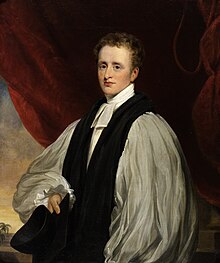Brightest and Best
This article needs additional citations for verification. (January 2023) |
| Brightest and Best | |
|---|---|
 "Reginald Heber" (1822) by Thomas Phillips | |
| Genre | Hymn |
| Written | 1811 |
| Text | Reginald Heber |
| Based on | Isaiah 60:1-6 |
| Meter | 11.10.11.10 |
| Melody | "Morning Star" by James P. Harding, "Epiphany" by Joseph Thrupp, and "Star in the East" by William Walker |
"Brightest and Best" (occasionally rendered by its first line, "Brightest and Best of the Sons of the Morning") is a Christian hymn written in 1811 by the Anglican bishop Reginald Heber to be sung at the feast of Epiphany.[1] It appeared in Heber's widow's compilation of hymns entitled Hymns Written and Adapted to the Weekly Service of the Church Year in 1827.[citation needed] It can be sung to a number of tunes, including "Liebster Immanuel" (no 41 in The English Hymnal), "Morning Star" by James P. Harding, "Epiphany" by Joseph Thrupp, and "Star in the East" by William Walker.[2] It appears in many hymnals across different Christian traditions. It has been recorded by a number of artists, including Glen Campbell, Joanne Hogg and Kathy Mattea (on her album Good News). The Kentucky traditional singer Jean Ritchie often sang this and told of her childhood memory of her grandmother sitting by the fire and singing it quietly to herself on Twelfth Night; the Library of Congress collected it from her in 1951.[3]
Lyrics
[edit]Brightest and best of the sonsa of the morning;
Dawn on our darkness and lend us thine aid;
Star of the East, the horizon adorning,
Guide where our infant Redeemer is laid.
Cold on His cradle the dewdrops are shining;
Low lies His head with the beasts of the stall;
Angels adore Him in slumber reclining,
Maker and Monarch and Savior of all!
Say, shall we yield Him, in costly devotion,
Odors of Edom and offerings divine?
Gems of the mountain and pearls of the ocean,
Myrrh from the forest, or gold from the mine?
Vainly we offer each ample oblation,
Vainly with gifts would His favor secure;
Richer by far is the heart’s adoration,
Dearer to God are the prayers of the poor.
Notes
[edit]- a Occasionally, "stars" is substituted for "sons"
References
[edit]- ^ C. Michael Hawn. "History of Hymns: Hymn honors Christ child as the 'Brightest and Best'".
- ^ Willard, Karen (2009). An American Christmas Harp (2009 ed.). Buckley, WA: Weelyrd Publishing. pp. 90, 91. Retrieved 3 December 2023.
- ^ "Brightest and best". Library of Congress.

